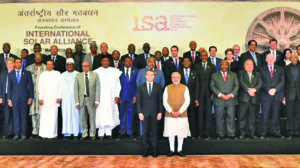…Guyana ideally placed to become a ‘solar state’ – Granger
President David Granger has said Guyana’s ‘green’ development thrust is not merely about environmental and economic security, but is also about energy security.
Speaking at the International Solar Alliance (ISA) Founding Conference and Solar Summit held on Sunday in New Delhi, India, the Guyana Head of State told world leaders that Guyana is strategically located in relation to the Equator, and that puts this country in an ideal position to become a ‘solar state’.
“Its [Guyana’s] strategic location in the Tropic of Cancer and a mere 6.8 degrees north of the Equator makes it suited for solar energy generation. It enjoys an average of 12 hours of daylight all year round, with consistently high levels of solar insolation,” he detailed.

President Granger told the high-level forum that Guyana’s low population density of 3.5 persons per square kilometre (km2) and the fact that many of its hinterland communities are small and isolated make solar energy a necessary response to the challenges of its demography and geography.
He explained that the development of solar energy-generation options by reducing the negative effects of the use of fossil fuels would ensure improved air and water quality while mitigating the adverse effects of climate change.
“Guyana has begun to transition to increased solar power generation and use. Solar farms are being planned and established, solar-powered street lights are being installed, and Government buildings are increasingly being equipped to use solar energy. Incentives are being offered to encourage this transition to solar technologies,” he explained.
“Guyana has the physical conditions for increasing (solar power) generation, but needs technologies to develop capacity in the solar energy sector. Much more needs to be done in other fields, such as education, communication, transportation and housing,” the Head of State detailed.
President Granger called on the ISA to ensure that sun-rich states such as Guyana have access to the necessary solar technologies; and urged this international body to ensure that small states benefit from investment, innovative technologies, photovoltaic infrastructure, information-sharing, and the dissemination of scientific and technological data.
He said the ISA represents a leap forward towards ensuring that solar power becomes more accessible and more affordable to more people.
“Small states are limited not only in size, but usually also in human resources, technology and capital. Small states need support in the form of investment, innovative technology, infrastructural photovoltaic systems, and capacity-building in order to close the technological gap with larger and richer states. The International Solar Alliance, from the start, should support the energy ambitions of the small sunbelt states by promoting investment-financing mechanisms for solar technologies,” President Granger said.
He pointed out, too, that the ISA must promote information-sharing and technology transfer relative to solar energy, and capacity-building in the solar energy sector.
Guyana signed and ratified the Framework Agreement of the International Solar Alliance on January 30, 2018. The President has described the ‘Alliance’ as an essential element in ensuring energy, economic and environmental security.
The ISA Framework Agreement was launched on November 30, 2015. ISA is an action-oriented international and inter-governmental organisation that aims to maximise the harnessing of solar-energy potential, modernise energy systems, universalise access to energy, accelerate economic development, and alleviate poverty.
This Solar Summit was hosted jointly by the Governments of India and France.
Meanwhile, President Granger and Prime Minister of India, Shri Narendra Modi have pledged to strengthen the historical ties between Guyana and India through increased cooperation. During a bilateral meeting held in New Delhi, India, Prime Minister Modi told President Granger that India is willing to do whatever it can to support Guyana’s development and pointed out that there are many areas for cooperation, particularly in the sugar and oil sectors. Guyana’s Head of State visited India to attend the International Solar Alliance (ISA) Founding Conference and Solar Summit.
During the meeting, the two leaders reviewed the scale of Guyana-India relations and agreed to continue discussions when Prime Minister Modi visits Guyana later this year. President Granger also used the opportunity to update his Indian counterpart on the developments regarding the Guyana-Venezuela border controversy and expressed his appreciation for India’s support for Guyana on this matter, for which a final resolution will be sought at the International Court of Justice.
This meeting follows closely on a visit to India, in January of this year, by a delegation led by Minister of Foreign Affairs, Mr. Carl Greenidge during which Guyana and India signed three cooperation agreements-one on renewable energy, one on cultural exchange and the framework agreement on ISA.



